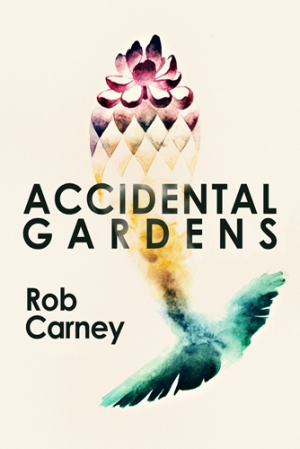Accidental Gardens
Accidental Gardens is a rich essay collection that imparts the inherent value of writing poems and essays, which can be both impactful and fun.
Inspired by the Japanese writing form haibun, the forty-two essays in Rob Carney’s Accidental Gardens are exploratory and meditative as they address nature, poetry, and politics, often with accompanying poems.
Influenced by Carney’s time in the Pacific Northwest and Utah, these artistic, playful pieces probe the natural world and poetry as a craft. Carney’s observations of environmental wonder lead to expressions of political outrage regarding conservation and climate change. Many of the underlying points are still relevant, though most of the politicians mentioned by name are no longer in office.
But the book’s political content is minimal in comparison to its other topics, including soaring poetic digressions that are full of revealing technical insights, and fascinating examinations of poetic form, style, and intent. Delivered with passion and enthusiasm, the book’s pieces on poetry include humble lessons and questions that revel in new, exciting possibilities.
The book’s discussions of rhyme and meter work up to a possible explanation of the origins of iambic pentameter, which is found in the sounds of blacksmiths’ shops. The book argues that the major benefit of poems, in contrast to other forms of writing, is that they’re short and “epigrammatic.” Elsewhere, the book cites “weirdness as evolution” in writing poetry; it shares poetic examples before again turning to the natural world to illustrate the wonderful strangeness of moose closing their nostrils and submarining.
Innovative, entertaining poetic techniques are introduced, including Carney’s sestonnet, or attempts at “translating” foreign language poems based on how the language looks and sounds. Thus, an Icelandic poem, “Vetrarhugar” or “Winter Minds,” becomes “Are You Hungry?” while one called “Vatnaskil” (“Watershed”), is reformed into an English poem, “What Are Your Skills?”, with the words “skolad” and “purrt” becoming “Sea School” and purring cats.
Though much of the book discusses poetry, prose is its primary style. Its narration slips in and out of the roles of a bard, critic, and student. “How to Carve a Pumpkin” points out that the American celebration of Halloween borrows from Mexico and Ireland, and expands on the latter by detailing the story that gave rise to jack-o-lanterns. What sets this and other entries apart is the wide array of connections that inform them: here, reflections on Halloween lead to meditations on humpback whales, Rainier cherries, and Miles Davis.
Further, the book’s essays overflow with creativity, as demonstrated in “Seven Seeds,” which mentions a vacuum system for helping salmon traverse dams in order to spawn, and imagines the oral history that might be passed down from one generation of fish to the next: “Then you shall come to the Place of Reversal, where the river suddenly pulls, and you’re launched into flying, but do not fear.”
Accidental Gardens is a rich essay collection that imparts the inherent value of writing poems and essays, which can be both impactful and fun.
Reviewed by
Peter Dabbene
Disclosure: This article is not an endorsement, but a review. The publisher of this book provided free copies of the book and paid a small fee to have their book reviewed by a professional reviewer. Foreword Reviews and Clarion Reviews make no guarantee that the publisher will receive a positive review. Foreword Magazine, Inc. is disclosing this in accordance with the Federal Trade Commission’s 16 CFR, Part 255.

